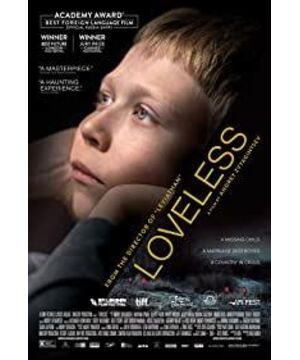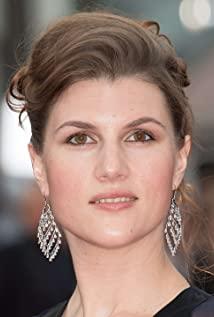In the hands of the Russian director Andrei Sarkinsev, the child is often a factor of uncertainty. He is either the center of the story or the puzzle in the story, the former like "Return", the latter like "Lee Vitan" and "No Love to Tell".
The film "No Love to Tell" tells the story of a world where "love is missing". In the film, the family of three falls apart. The father cheats and enlarges a young girl's belly. Similarly, the mother finds another new love and enjoys the second spring with a man who is a dozen years older than her; only the son is alone, Although he lived with his mother, he had to bear his mother's grievances, while his father ignored him.
When both parents enjoy happiness in their own emotional world, the son disappears. But the open-hearted parents were not worried at first, they only thought that the child was playing outside, and even in the process of looking for the child, they could complain about each other and turn a deaf ear to the son's affairs. Unfortunately, in the end, the child was brutally presented in the morgue, and the two parents collapsed in an instant, hugging each other and crying, but it did not affect their future lives, and the film faded away in the quiet daily life of the two.
"No Love to Tell" poster
Sarkinsev's 126-minute new film doesn't come with too many surprises, and he even fades the aftertaste of the "poetic cinema" he still had in Leviathan, leaving only a few landscape images as "" Poetic" dry grave, if you have seen Sarkinsev's directorial debut "Return", "No Love to Tell" is of course disappointing.
Saginsev was not synonymous with "deliberate" and "ordinary" at the beginning. He belonged to the kind of director who made a sound of thunder. In 2003, he won the best of Venice in 2003 with his debut "Return". Debut Award and Golden Lion Award, and the film "Return" makes an allegorical arrangement of "Soviet Union" and "Russia", present and future, surreal, poetic, and mythological narratives can all be placed in this film On his head, many people said that they saw Tarkovsky's remnants in him.
And this kind of residual thread is gradually fading, "poetic" is covered with rust, while "common" is overwhelmed.
"Return" poster
In "Leviathan", the trivialities of the family and the troubles of daily life in Russia continue to appear in the film, and even a car repairing plot will be talked about. Sarkinsev seems to no longer believe in poetry and poetry. Fables can become the dominant force of images, but they have turned to the mundane dimension, hoping to comb through the nuances of life and pile up the themes and dilemmas of the whole life.
But at the beginning, in Sarkinsev's view, the "dilemma" was grand, it was about nation and society, it was about the past and the future, it was a kind of superstructure problem. "Return" sets a man who returns to his family after twelve years, and arranges a communication and dialogue between father and son. But family love is not the theme of this film. The son is rebellious and even questioned the authenticity of his father, so that his father accidentally stumbled and lost his life. The film uses a road movie mode and discusses "dialogue".
The father is the incarnation of the "former Soviet Union", and the two sons symbolize the two attitudes of Russia towards the Soviet Union at present, one misses and obeys, the other questions and resists. But in the end, the Soviet Union will be sacrificed, and Russia will only mourn, but will not look forward to its "return" again.
The death of such a key character is like a riddle for Sarkinsev, he always makes the character inadvertently go to destruction, but this kind of death is necessary, only if he/she really dies, the theme of the movie is will be balanced.
Leviathan poster
In "Return", the death of the father is to complete the growth of the son, and the mother wants the two sons to stay with the father for a period of time, in order to complete the process of "parenting", a process with a sense of ritual as early as the Paleolithic The era has already arisen, when young boys must be separated from their mothers, the boys who participate in the ceremony must first be buried underground, and must endure physical pain and darkness. Only after "death" can they be "reborn". This ancient myth is like a footnote in "Return," in which Andre and Ivan return to civilization after their father's death.
In Leviathan, the hero's second wife died unexpectedly. At first, fans thought it was suicide, but later, the evidence showed that it was murder. However, through video logic, it is not difficult to guess that the murderer of the wife was probably not the husband, but the husband's son Rome. Rome has always disapproved of her stepmother, not necessarily because of "emotional estrangement", but the real reason may be "sexual desire for her". The death of the stepmother rebalances the family, the drunken father ends up in prison, and the adolescent boy must grow up alone.
This balance of death has become a necessary condition in "No Love to Complain". The son's situation is very embarrassing, because the parents have a new love, and the source of their resentment is themselves. He is a loveless crystallization, in order to fulfill the wishes of men and women, Sarkinsev used the cruel death of children to fulfill them.
For Sarkinsev, "balance" is both core and formal. In his images, the composition is often centrally symmetrical, and the characters are often placed in the middle; and in the overall structure of the film, it is still the same , his films often use one or a group of fixed scenes as a description lens, and put the environment and atmosphere first, and then let the characters in the story shuttle through it, and when the film ends, the fixed scenes appearing at the beginning are symmetrical again. Appearance, even the music is neat, if the symmetrical obsessive-compulsive disorder of Wes Anderson's "The Grand Budapest Hotel" is a form of beauty, then Sarkinsev's symmetrical form is a hidden authority.
This kind of authority is like the father in "Homecoming", like the mayor in "Leviathan", more like the father and mother in "No Love". They all determine the story development of the entire movie in some form or another.
Andrei Sarkinsev was born in 1964 and spent 27 years of his life in the Soviet Union. The one-party system and authoritarianism inherent in the Soviet Union are believed to be the source of his authoritative perspective. After all, in "Return", "Leviathan" and "No Love to Tell", every child in the three films is nostalgic for the dilapidated buildings of the Soviet era, and they all use a bygone era of authoritarianism as a paradise, entangled in the The "past and present" question in Sarkinsev's mind may not have been answered yet.
This article first published "China Film Index"
Please make an appointment or reprint on Doumail!
View more about Loveless reviews










